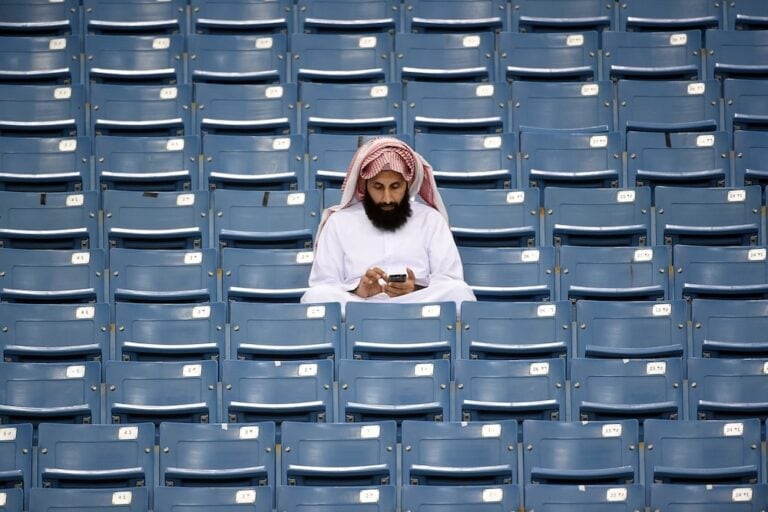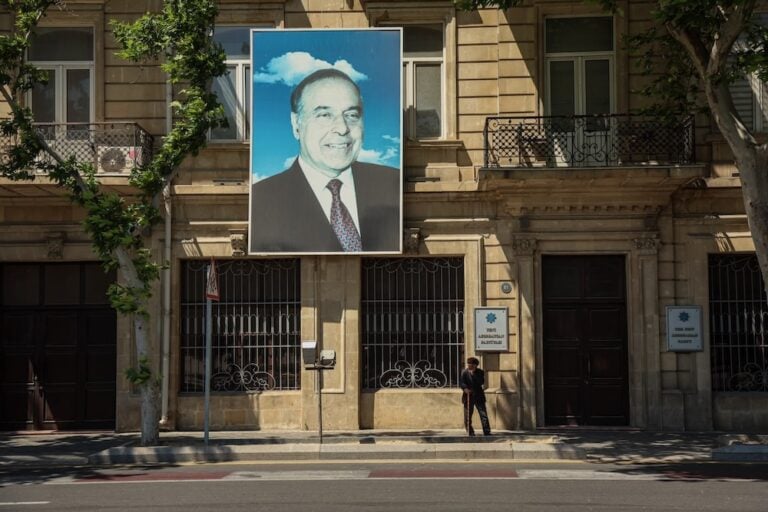The new arrests, of Saleh al-Dhufairi and Salem Sahooh, bring to 11 the total number of detained members of the group, the Reform and Social Guidance Association (al-Islah), since late March 2012.
(Human Rights Watch/IFEX) – Beirut, May 10, 2012 – United Arab Emirates (UAE) authorities have expanded their crackdown on peaceful political activists with the recent arrests of two more members of a non-violent political association advocating greater adherence to Islamic precepts, Human Rights Watch said today. The new arrests, of Saleh al-Dhufairi and Salem Sahooh, bring to 11 the total number of detained members of the group, the Reform and Social Guidance Association (al-Islah), since late March 2012. Authorities should end this crackdown immediately, and release all activists detained simply for exercising their right to freedoms of expression and association, Human Rights Watch said.
Al-Islah sources and family members told Human Rights Watch that the recent arrests appear to have been motivated solely by the men’s affiliation with the association. Members of the group have been increasingly critical of government policies and the actions of security services over the past year, and several signed a petition submitted in March 2011 to UAE authorities demanding democratic reforms.
“These new arrests are yet another worrying sign of an increased crackdown in the UAE on voices critical of state policies,” said Sarah Leah Whitson, Middle East director at Human Rights Watch. “Emiratis should be able to talk about reform without fear of being arbitrarily arrested by the security services.”
Witnesses and al-Islah sources told Human Rights Watch that state security officials detained the two men on April 29, 2012, without producing warrants or informing them of the reasons for their arrests, and are holding both in undisclosed locations.
Ten plainclothes security members arrived in two unmarked cars at a mosque in Ras al-Khaima emirate on the morning of April 29. They detained al-Dhufairi, 51, as he left the mosque after morning prayers.
A family member, who was in the mosque and observed the arrest, told Human Rights Watch that the plainclothes officers identified themselves as “police” but would not produce any identification or a warrant. The family member said he believes the men were from the UAE’s Amn al-Dawla (State Security), a federal security service that reports directly to the office of the UAE President under Law 6 of 1976.
The family member told Human Rights Watch that he made inquiries with local police authorities in Ras al-Khaimah as well as the local public prosecutor’s office, trying to find out where al-Dhufairi was being held and whether charges had been filed against him. Both told him that they had no record of al-Dhufairi’s arrest. The police also told him that the license plate numbers of the two cars used by the security officials were not in the police database. A spokesman for the Ras al-Khaimah police told Reuters on April 29: “We have no details on this case. We were not involved.”
Later that day, at approximately 8 p.m., a group of plainclothes officers stormed Sahooh’s home in the emirate of Sharjah and conducted an extensive house search in front of Sahooh and his family, al-Islah sources told Human Rights Watch. The men presented no warrant, the sources said. The officers arrested Sahooh, 55, and took him away at 6 a.m. His whereabouts are unknown, and his family has not been able to contact him.
“UAE security forces are raiding the homes of citizens and carrying them away apparently simply because they belong to an association critical of the government,” Whitson said. “These actions are reflective of a government that does not respect the rights of its citizens to freedom of association and expression.”
Authorities previously arrested al-Dhufairi at his home on March 6, after he made comments on Twitter criticizing UAE authorities. The comments criticized the arrest and deportation of Syrians who had demonstrated peacefully in front of the Syrian consulate in Dubai in February, as well as authorities’ threats to revoke the citizenship of other al-Islah activists. A Dubai police spokesman accused him at the time of “spreading ideas by speech, writing, and any other means that provoke strife, hurt national unity, and social peace.” Authorities had released al-Dhufairi on bail on March 20.
The UAE authorities began their crackdown on al-Islah in December 2011. The government said through its official news agency that it had stripped six al-Islah members – Dr. Ali Hussain al-Hammadi, Dr. Shahin Abdullah al-Hosni, Hussein Munif al-Jabri and his brother Hassan Munif al-Jabri, Ibrahim Hassan al-Marzouqi, and Sheikh Mohammad Abdul Razak al-Sediq – of their UAE citizenship. There is no evidence in official records, however, that authorities followed the steps required to strip a person of citizenship.
The authorities began arresting al-Islah members on March 26, when security forces arrested Dr. Ahmed al-Zaabi, a former judge, and Ahmed Ghaith al-Suwaidi together at a Dubai gas station.
On April 9, the authorities detained the six men they claimed to have stripped of their citizenship after they refused to sign a pledge to search for a new nationality, their families reported.
Authorities detained the chairman of al-Islah, Sheikh Dr. Sultan Bin Kayed al-Qasimi, on April 20.
Human Rights Watch previously called on UAE authorities to release these nine al-Islah activists immediately and unconditionally and to stop threatening to revoke the citizenships of seven al-Islah members.
In addition to al-Dhufairi and Sahooh, al-Suwaidi and al-Zaabi are apparently being held in an undisclosed location, while al-Qasimi is reportedly being held in the palace of the ruler of Ras al-Khaimah, who is his father’s cousin, his relatives were told. Authorities are holding the remaining six at the al-Shihama deportation centre in Abu Dhabi.
Article 14 of the Arab Charter for Human Rights, to which the UAE is a party, prohibits arbitrary arrest. The United Nations Working Group on Arbitrary Detentions says detentions are arbitrary if there is no clear legal basis for the arrest or if the person is arrested for exercising the human rights to freedom of expression and peaceful assembly, among others.
“These arrests show a blatant disregard for international law and human rights standards that the UAE has pledged to uphold,” Whitson said. “The government should immediately halt this campaign of repression and release these activists.”


